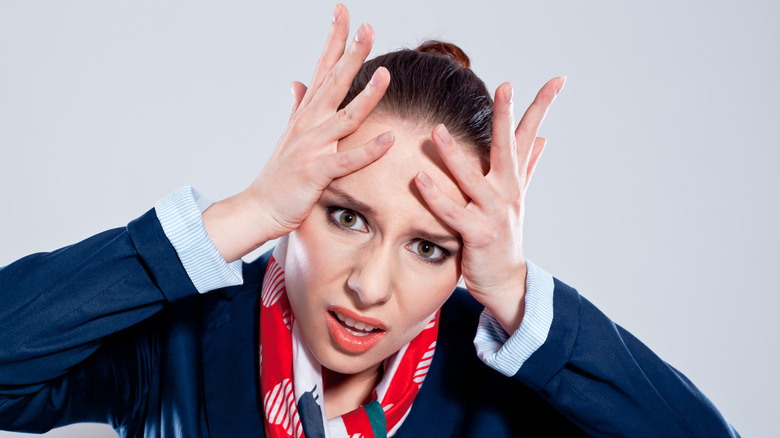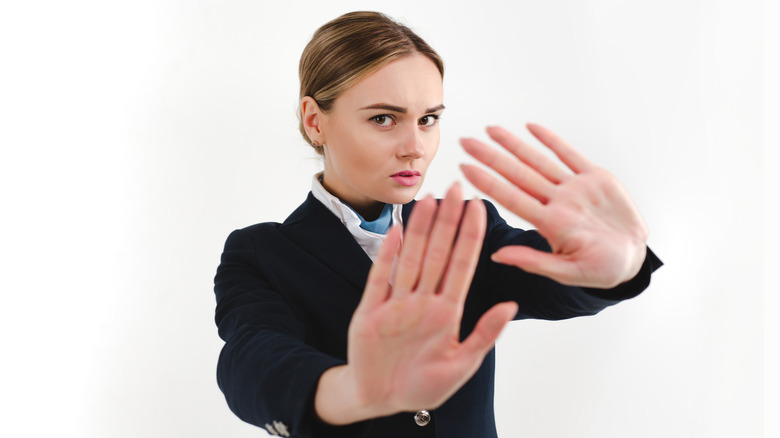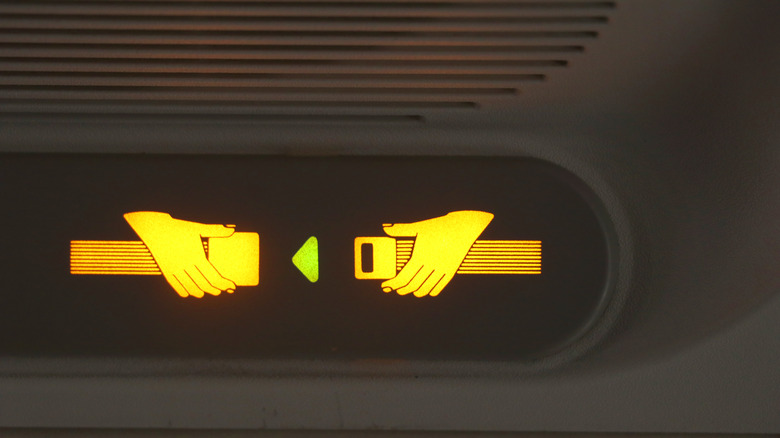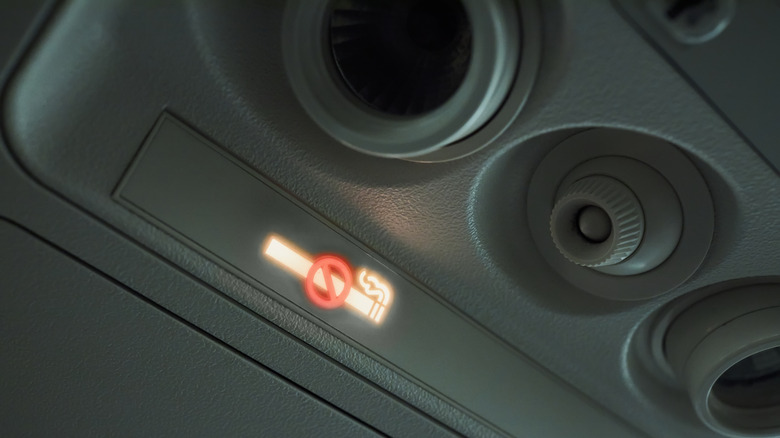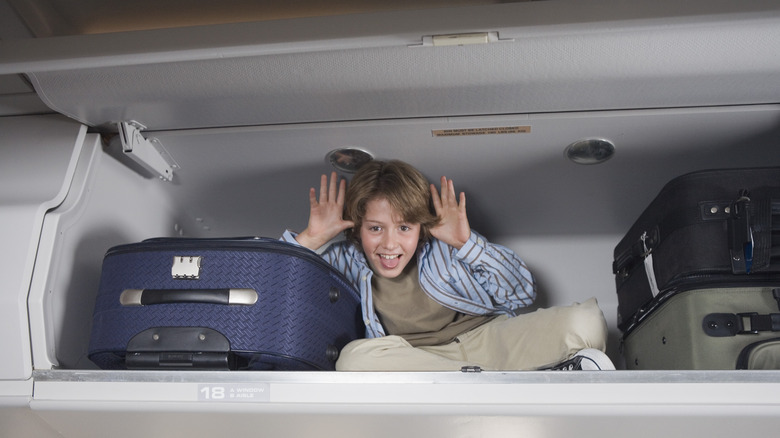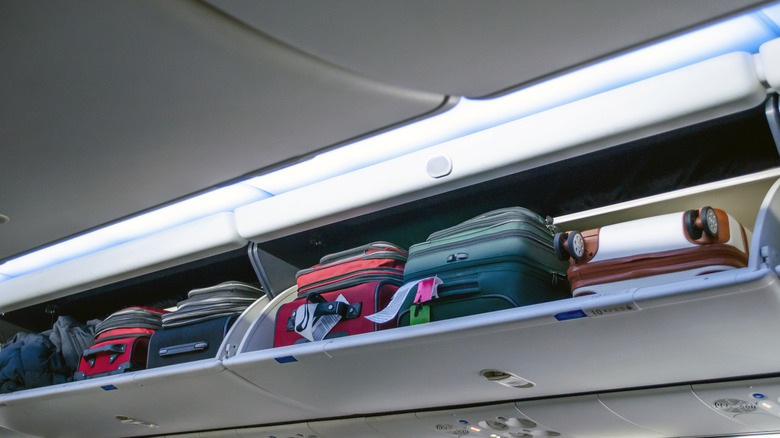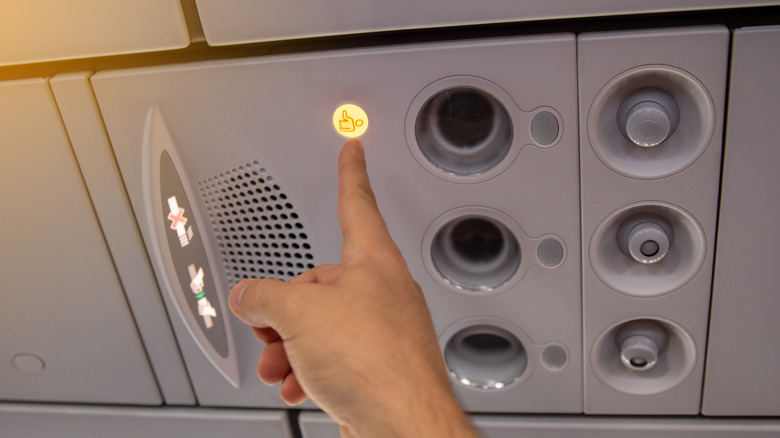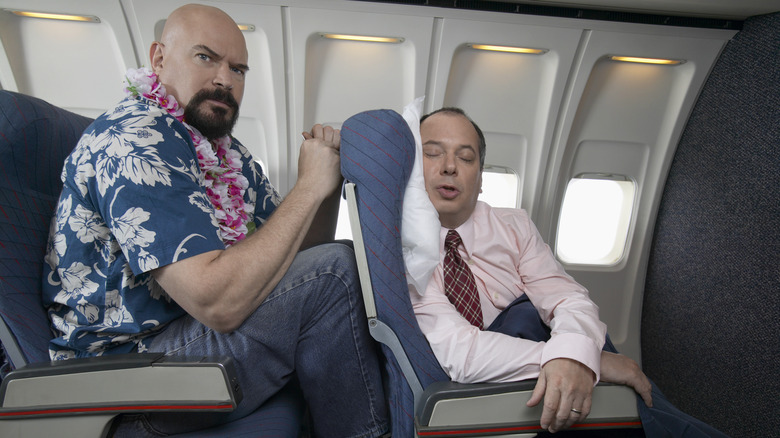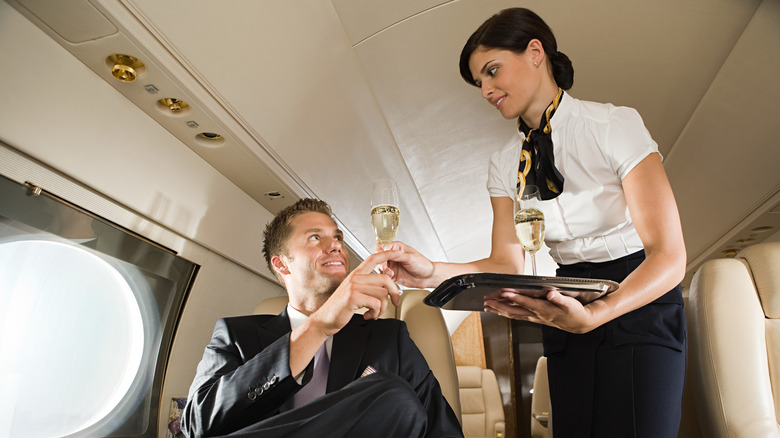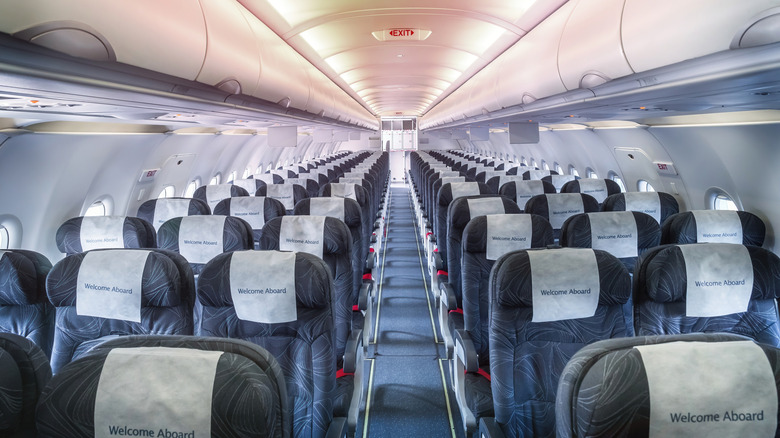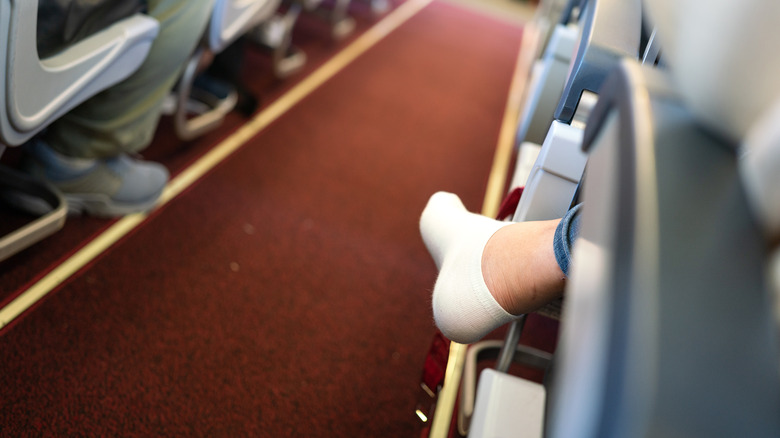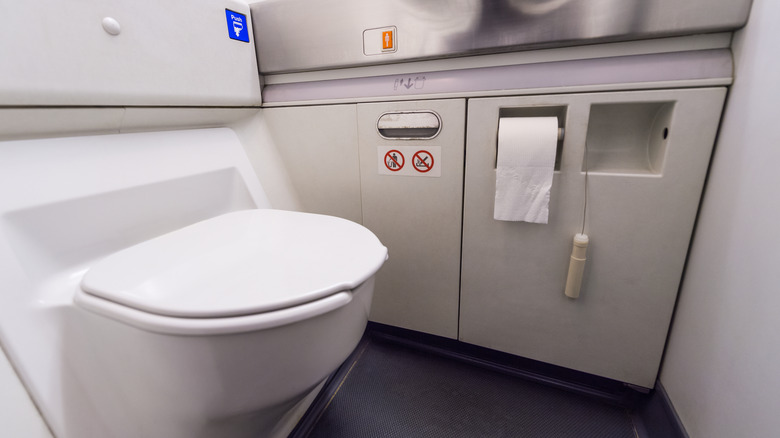Flight Attendants Strongly Advise Against Doing These Things On A Plane
Flight attendants could go on forever about what passengers should not do on an airplane, but we don't have that much time. Instead, we've compiled a list of specific things flight attendants strongly advise against doing on an airplane — following this advice will ensure everyone's flight is a safe and pleasant experience. After all, not following flight attendant advice while flying is a good way to ruin a person's flight — if not their day. Ignoring flight attendant flight advice can lead to a slew of not-good outcomes. At best, a flight could be delayed; at worst, delinquent passengers face removal from the aircraft and legal consequences, not to mention possibly compromising an aircraft's safety.
Traveling is fun, but airplane cabin conditions can change on a dime — flight attendants are the ones who toil constantly to ensure every flight is safe and smooth. Not surprisingly, flight attendants are feeling the weight of all that work. In 2021, thAIRapy, a mental health nonprofit providing counseling services to flight attendants, told CNN it logged more than 10,000 messages between exhausted flight attendants and support workers within six months of launching. So, to make the lives of flight attendants easier — and keep you safe — follow their advice on what not to do on an airplane.
To compile this list, we consulted flight attendant threads and posts on social media, blog posts, op-eds written by flight attendants, and more.
Verbally or physically assaulting flight attendants or passengers
The first thing flight attendants strongly recommend against passengers doing is assaulting them or other passengers, verbally or physically. As a veteran flight attendant on Reddit put it, "...verbally assaulting a flight attendant will get you kicked off the flight. No questions asked." And when things don't go as planned and a flight is delayed? That's not the flight attendant's fault, yet they often get yelled at for not being able to fix the plane or do something to resolve a delay. As Natalie Rader, a former Delta flight attendant, wrote in an op-ed for Business Insider, "...it's important to remember that when you throw a fit, it doesn't get you anywhere." Not with the flight crew and not one step closer to your destination.
While verbal assault is a no-no, physically assaulting a flight attendant (or another passenger) or threatening to do so will get a passenger kicked off a plane and land them in legal trouble, too. As one flight attendant named Anais Monique reminded the public in another Business Insider piece, the Federal Aviation Administration (FAA) has a zero-tolerance policy towards unruly and violent passenger behavior. The FAA can impose hefty fines on passengers, up to $37,000 per violation (and yes, passengers can be charged with multiple violations). The FAA also won't hesitate to refer unruly or violent passengers to the FBI.
Standing up during takeoff, landing, or during turbulence
Standing up when the seatbelt sign is on is never a good idea, and flight attendants strongly advise against doing so. The cockpit has access to information that passengers do not, so when the seatbelt sign comes on, it does so for a reason. As one flight attendant on Reddit aptly put it, "If you're standing up and we hit level 3 turbulence and you go flying through the cabin, you'll get hurt, other passengers will get hurt, or we'll get hurt." In short — mind the seatbelt sign.
Something else flight attendants stress not to do is standing up during takeoffs and landings. Why? Because it is dangerous. As another flight attendant (whose account has since been deleted) on the same thread commented, "I don't care how badly you have to go to the bathroom. If we are sitting, you should definitely be sitting." There is data to back up this flight attendant's warning. A study by airplane manufacturer Boeing and detailed on Business Insider found that both takeoff and landing are by far the most dangerous parts of a flight — 14% of fatal accidents occur during taxiing and takeoff, while a whopping 49% occur during the landing phase. Stay seated!
Smoking or vaping on a plane
In a TikTok post that went viral, flight attendant Natalie Magee spelled out why flight attendants recommend passengers never smoke or vape on an airplane. First off, smoking or vaping on a plane is against the law — the fine for smoking while airborne can reach up to $4,000. Second, she explains that if a flight crew believes someone has been smoking or vaping while in the air, the aircraft will be grounded upon landing. Maintenance crews must inspect the engines to determine the cause of the alarm and, if necessary, make any repairs. In this instance, grounding can last up to two hours and seriously delay travelers with connections to catch. All for someone's precious puff.
Of course, all of the above are the least bad outcomes if smoke is discovered on an airplane. As flight attendant Anaïs Monique wrote in her Business Insider piece, a mid-air smoke alarm sends flight attendants into emergency mode. An undetected, mid-air fire — even from an unattended cigarette in a lavatory — can go from dangerous to catastrophic in just minutes. Research detailed by Aviation Safety magazine demonstrates that it can take just 20 minutes for a dangerous smoke situation on an airplane to turn disastrous — and deadly. Fires can consume planes quickly, especially if the source of the fire can't be found. So heed the law and flight attendants' advice to never, ever smoke on board an airplane.
Letting your kids run wild
Flight attendants understand that flying can be both exciting and draining, especially for parents with kids in tow. That said, flight attendants' main priority is keeping everyone safe — not to look after passengers' children. Flight attendants forced to look after delinquent parents' children compromise flight safety. One former flight attendant dished on Reddit how children (lovely as they are) on an airplane can be both dangerous and, well, unsanitary. She noted the serious safety risk of kids running wild in the aisle, be it due to heavy service carts going back and forth or if an emergency situation arises. Children treating the lavatory like a playhouse is also unsanitary, not to mention unfair to other passengers needing the loo for legitimate purposes.
Another no-no from flight attendants is disciplining other people's children. Doing so might feel heroic, but as veteran flight attendant Kristie Koerbel wrote in The New York Times, this can quickly lead to arguments with parents who do not appreciate other people dressing down their children, even for legitimate reasons. If a child is repeatedly kicking the back of your seat, Koerbel recommends delicately broaching the issue with the child's parents, no matter how annoyed you might be. It is important not to be accusatory, she noted, to avoid making the situation worse. If the situation does become worse, guess who has to deal with it? Flight attendants — and they have more important things to do!
Abusing overhead bin and aisle space
Stowing carry-on bags in the overhead bins can become a flashpoint for cabin arguments. Flight attendants strongly advise against hoarding overhead bin space — as Koerbel reminded her readers, overhead bin space is meant to be shared and is available on a first-come, first-serve basis. They also advise against taking the initiative to rearrange the overhead bins, as this interferes with other passengers getting to their seats — flight attendants can get this done quickly while ensuring everyone's stuff is stowed safely. Be sure to follow airplane etiquette and avoid the worst — and most controversial — spot on a plane to put your carry-on bag.
The aisle is another problem spot on airplanes that flight attendants wish passengers would be more mindful of. On every flight, flight attendants frequently move back and forth, and errant legs, arms, hands, or heads can get in the way, posing a safety hazard. No one wants one of their appendages knocked by a heavy service cart, and the last thing flight attendants need is to trip over someone on their way to deal with an emergency.
Abusing the call button
Abuse of the call button is a common pet peeve for flight attendants. As a flight attendant on Reddit advises, do not push the button during taxi, takeoff, or landing. The user succinctly put it this way: "I'm not going to get up. DUH." Flight attendants would also love it if passengers refrained from hitting the call button for trash collection, as flight staff are guaranteed to make their way through the cabin with bags and gloves at specified times during your flight.
Also, don't hit the call button multiple times when flight attendants are already heading down the aisle in your direction. They will get to you. If you're in the middle or window seat, go ahead and hit that call button — flight attendants are more than happy to bring you a drink or attend to your needs. They'd much prefer that over watching you climb over other passengers en route to the galley to ask for a bag of peanuts.
If there is a legitimate reason to press the call button, go ahead and do so, as flight attendants always prefer this to passengers touching, grabbing, or poking them to get service — this is never okay. As a flight attendant put it on a Reddit thread, "...I know most of them don't mean any harm by it, but it ignites a rage within me like no other."
Reclining your seat without asking the passenger behind you
Flights can be uncomfortable, and reclining is one of the few luxuries most passengers get. According to Koerbel, flight attendants prefer that passengers check with the person in the seat behind them before slamming that seat back. Reclining a seat without giving any warning is a great way to break someone's laptop, spill their hot coffee, or send their chicken cacciatore flying. Some flight attendants will try to pre-empt any potential problems by asking passengers to bring their seats upright when meals are served. After all, reclining a seat abruptly has led to mid-air arguments and even in-flight fisticuffs. Flights have even been diverted due to fights breaking out because of a passenger suddenly and aggressively reclining their seat back.
Of course, if a seat won't recline, get the flight attendant to help instead of pushing it and causing any damage (let alone inconveniencing the person behind you). Another flight attendant, writing on Outside, offered a pro tip — don't grab onto the seat in front of you when getting up. Flight attendants often cite this as another major flight annoyance.
Drinking heavily on or before a flight
Flight attendants understand that a flight is often the beginning of a person's vacation or the last chance to enjoy holiday vibes before returning to the everyday grind. Still, they strongly advise against going two sheets to the wind on the plane. To start, flight attendants like Monique have turned away travelers at boarding if they weren't in control of their motor functions or even if they smelled strongly of alcohol.
Once on the plane, don't even think about cracking open that duty-free alcohol you brought. Monique wrote that flight attendants are bound by FAA regulations to monitor passengers who bring duty-free alcohol onto a flight. If they see a passenger sneaking some sauce from a bottle brought onto the plane, the flight attendants will confiscate said bottle until the flight is over.
Another reason why flight attendants advise drinking sparingly on your next flight? A person's alcohol tolerance is usually lower on a flight due to less oxygen in the pressurized cabin. This means light-headedness can arrive faster on a plane, and alcohol can exacerbate that. Alcohol can also make motion sickness worse, so if you're prone to experiencing this, think twice before downing a drink while flying.
Solving seating arrangements as you board
If you're looking to find someone to swap seats with you as you board, or if you want a flight attendant's help to do so, veteran flight attendant Koerbel's advice is simple — don't. Boarding time is chaotic at the best of times, and flight attendants can't facilitate seat changes as other passengers are frantically trying to stow their luggage and take their seats. Another flight attendant on TikTok told Business Insider that booking ahead of time is the best way to ensure you don't have to frantically attempt to switch seats while boarding. Sure, you might have to pay an extra fee to ensure your family or friends sit together (or if you know the unexpected reason to sit on the left side of the plane), but it can save plenty of headaches when boarding time arrives.
Koerbel also wrote that checking with the gate agent ahead of time can also alleviate any seating arrangement worries. Gate agents have the flight's seating plan (flight attendants likely do not, at least on hand) and can help you rearrange your seats if availability allows.
Taking your shoes and socks off on the plane
Despite efforts to keep planes clean, they're not always squeaky-clean places to be. This makes flight attendants' recommendation to keep shoes and socks on during flights not the least bit surprising — one flight attendant told The Daily Mail that " airplane carpets are filthy and the toilet floors are worse." The flight attendant also confirmed that, sometimes, passengers urinate in their seats and advised flyers to keep their shoes on while seated, even on a long flight.
It should go without saying, but flight attendants maintain that going shoeless to the lavatory is a big no-no. One Emirates flight attendant went viral in 2022 for telling her TikTok followers in a since-deleted video (detailed in the New York Post) to keep their shoes on in the lavatory because "...it may look like water on the floor but trust me guys, it's really not. I'm sure you can guess what it is." Flight attendants also advise against taking your socks off (not to mention walking around barefoot). In a pressurized cabin, smells travel easily, including foot odor, which isn't pleasant for anyone.
And if you have no choice but to unleash your bare feet on the plane, don't rest them on the armrest of the chair in front of you. No one wants to spend hours next to toenail fungus. Even if you have award-winning clean feet, it is immensely rude and disrespectful to plonk them into an unsuspecting passenger's world.
Touching the toilet paper
That's right — flight attendants strongly recommend against touching the toilet paper in the lavatory. One veteran flight attendant took to TikTok to inform viewers that the nasty reason flight attendants don't use lavatory toilet paper is because it is often hit by errant urine streams. Being in the lavatory during unexpected turbulence doesn't help folks either, and the basic mechanics of the human body make this particularly tasking for those who stand up to do their business. The flight attendant recommends using the tissue paper instead, which is usually located higher up and out of range of most urine streams that stray off-target.
Another flight attendant told her TikTok followers to bring some paper towels in their carry-on and use them instead, as they are far more absorbent than airplane tissue paper. Paper towels are more robust and won't dissolve in your hands. And for good measure, don't forget the one item you should never use a plane's restroom without. Airplane toilets aren't the cleanest spots in the world, and every little bit of personal security helps in the fight against germs.
